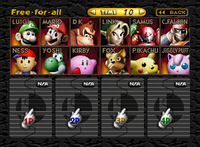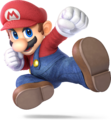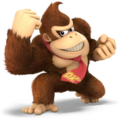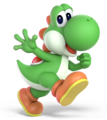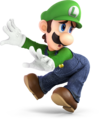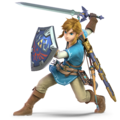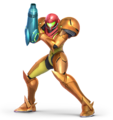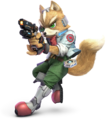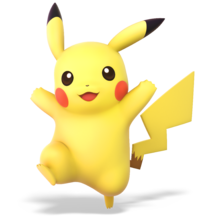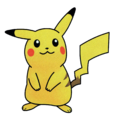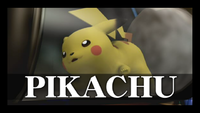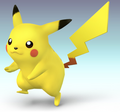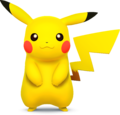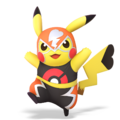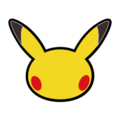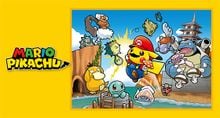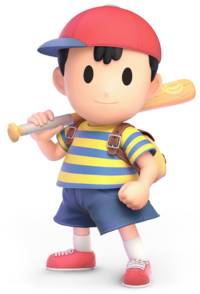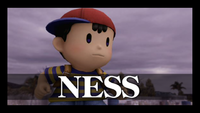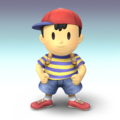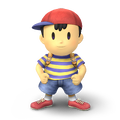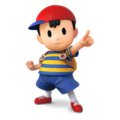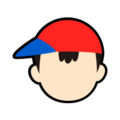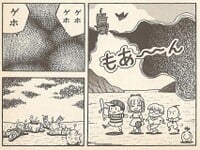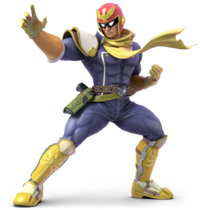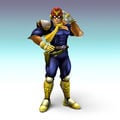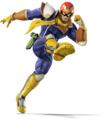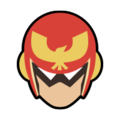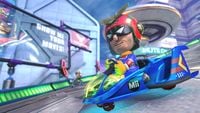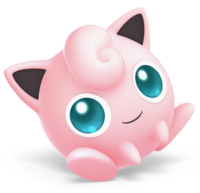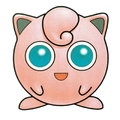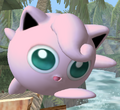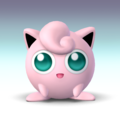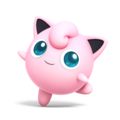List of fighters debuting in Super Smash Bros.
This is a list of Super Smash Bros. series fighters that debuted in the original Super Smash Bros. game. The page details their role in this series as well as other Super Mario-related media. Super Mario characters, as well as characters not originally from the Super Mario franchise who have had at least one significant appearance in bona fide Super Mario media, are covered in detail on their own articles.
See also:
- List of fighters debuting in Super Smash Bros. Melee
- List of fighters debuting in Super Smash Bros. Brawl
- List of fighters debuting in Super Smash Bros. for Nintendo 3DS and Super Smash Bros. for Wii U
- List of fighters debuting in Super Smash Bros. Ultimate
Fighters with articles[edit]
Pikachu[edit]
- Bulbapedia article: Pikachu (Super Smash Bros.)
- SmashWiki article: Pikachu
Pikachu is an Electric-type Pokémon and the mascot of the popular Pokémon series made by Game Freak. Pikachu has made some video game appearances alongside Mario, most notably in the Super Smash Bros. series, in which it is a default playable character in every installment. In the Pokémon series, Pikachu is the evolved form of Pichu and evolves into Raichu. Pikachu is voiced by Ikue Ohtani in the Super Smash Bros. series. She also voices Pikachu in Pokémon animation, as well as several mainline games (first in Pokémon Yellow Version: Special Pikachu Edition) and various spin-offs.
Pikachu is the only playable Pokémon in the Super Smash Bros. series to have a gender difference. Female Pikachu have a heart-shaped dent at the end of their tail, while the Pikachu in the Super Smash Bros. series does not except in two of its alternate costumes in Ultimate, which implies that the Pikachu in Smash is male. However, this distinction was not introduced in the Pokémon games until Pokémon Diamond and Pearl.
Super Smash Bros. series[edit]
Super Smash Bros.[edit]
- SmashWiki article: Pikachu (SSB)
Pikachu appears as a default character in Super Smash Bros. It is one of the game's faster characters in both running and walking speed, but is also among the lightest, meaning that while it can move quickly it can also be KO'd earlier than other characters. Its standard special move is Thunder Jolt, which sends out a ball of electricity that travels along the ground and causes opponents to flinch. Its up special move is Quick Attack, which allows it to move with up to two sudden bursts of speed. Its down special move is Thunder, which sends down a bolt of lightning from the top of the stage to strike opponents.
Gallery[edit]
Super Smash Bros. Melee[edit]
- SmashWiki article: Pikachu (SSBM)
Pikachu returns in Super Smash Bros. Melee, yet again as a default player. Pikachu's moveset is mostly unchanged from the previous game, though it now has a side special move, Skull Bash, which allows Pikachu to launch itself across the screen and headbutt opponents. In addition, its down special Thunder now appears from a cloud instead of the top of the screen. Pikachu's down smash is now a multi-hitting, electrical spin; additionally, its back throw from the previous game has been moved to its forward throw, though it is much weaker than before.
Pikachu's pre-evolution Pichu also appears as a playable character in this game, with a moveset similar to Pikachu's. In addition, one of Pikachu's alternate costumes in this game is the hat of Red as he appears in the original Pokémon Red and Blue Versions.
Gallery[edit]
Super Smash Bros. Brawl[edit]
- SmashWiki article: Pikachu (SSBB)
Pikachu was one of the first characters revealed for Super Smash Bros. Brawl. Its moveset remains entirely unchanged, and its Final Smash is Volt Tackle, which causes Pikachu to become a ball of electricity that players can maneuver across the entire screen, damaging any opponents it runs in to.
While Pikachu keeps most of its alternate costumes for this game, its blue alternate costume, the party hat, has been replaced with a pair of goggles, similar to the ones worn by Pichu as one of its alternate costumes. Pikachu is the only character in the game to have only four palette swaps.
The Subspace Emissary[edit]
Pikachu begins the game trapped within a strange device that harnesses its electrical energy to provide power to the complex. Samus, infiltrating the complex in search of her Power Suit, sees that the device causes Pikachu pain, and breaks it. In thanks, Pikachu helps Samus continue through the lab. Eventually, the pair come across Samus's Power Suit within a tank. After dispatching two clones of Samus, Pikachu helps Samus (in her newly regained Power Suit) through the rest of the facility and helps her defeat Ridley.
After escaping from the complex, Pikachu and Samus infiltrate the Subspace Bomb Factory and encounter the Ancient Minister. Despite Donkey Kong, Diddy Kong, Captain Falcon, and Captain Olimar coming in soon after, the Ancient Minister does not fight back, and tries to stop the other R.O.B.s from obeying Ganondorf. Ganondorf gets the R.O.B.s to set up multiple Subspace Bombs, and the Ancient Minister, with the R.O.B.s no longer under his control, reveals himself to be the head R.O.B. of the island and helps Pikachu and the others defeat the Subspace Army and escape the island in the Falcon Flyer before it is consumed by Subspace.
Pikachu and the rest of its team join the remaining heroes in their last stand against Subspace, only to be defeated by Tabuu. Fortunately, King Dedede had planned this in advance and created badges that revived fighters from being trophies. Using these, he is able to form a team consisting of himself, Luigi, and Ness. Dedede and his group then revived most of the others, including Pikachu, before everyone has rejoined and proceeded to face Tabuu in a final battle.
Gallery[edit]
Super Smash Bros. for Nintendo 3DS / Super Smash Bros. for Wii U[edit]
- SmashWiki article: Pikachu (SSB4)
Pikachu is once again a playable character in Super Smash Bros. for Nintendo 3DS and Super Smash Bros. for Wii U, its moveset once again unchanged from its previous appearances. Pikachu's Thunder move, which still summons a cloud, now acts as a meteor smash, which can do further damage to opponents.
In addition to its alternate costumes in Super Smash Bros. Brawl, two of its new alternate costumes are the hats of Ethan and Calem, the male trainers in Pokémon Gold and Silver Versions and Pokémon X and Y, respectively.
Gallery[edit]
Super Smash Bros. Ultimate[edit]
- SmashWiki article: Pikachu (SSBU)
Pikachu returns as a playable fighter in Super Smash Bros. Ultimate. Its Final Smash has it travel across the screen at a much faster speed than before, though the move needs to connect with another fighter in order to continue, and missing can lead to a self-destruct. It also has two new alternate costumes, one that swaps it out for the female Pikachu Libre and another where it wears Selene's cap from Pokémon Sun and Moon. Pikachu has various alterations to its moves and now appears angry during many attacks. Some of Pikachu's standard attacks receive names: its standard attack is Headbutt, its dash attack is Running Headbutt, its down smash is Electric Flower, its back aerial is Glider, and its down aerial is Electric Skew.
Pikachu's fighter spirits use its respective artwork from Pokémon Global Link. Pikachu also appears in various support spirits.
Classic Mode route[edit]
By completing Pikachu's Classic Mode route, it is possible to unlock Villager, Shulk, R.O.B., Mega Man, Isabelle, Mr. Game & Watch, or Pichu. Pikachu's Classic Mode route has it facing off against other Pokémon. The route's name, "I Choose You!", is a common phrase throughout the Pokémon franchise (for example, it is used in the title of the first episode of the Pokémon anime).
| I Choose You! | ||||
|---|---|---|---|---|
| Round | Opponent(s) | Rule | Stage | Song |
| 1 | Pokémon Trainer | Saffron City | Pokémon Gym/Evolution - Pokémon Red / Pokémon Blue | |
| 2 | Jigglypuff ×6 | Horde Battle | Pokémon Stadium 2 | Road to Viridian City - Pokémon Red / Pokémon Blue |
| 3 | Pichu ×2 | Prism Tower | Pokémon Gold / Pokémon Silver Medley | |
| 4 | Lucario | Spear Pillar | Battle! (Dialga/Palkia) / Spear Pillar | |
| 5 | Greninja | Kalos Pokémon League | Battle! (Wild Pokémon) - Pokémon X / Pokémon Y | |
| 6 | Incineroar | Pokémon Stadium | The Battle at the Summit! | |
| Final | Mewtwo Master Hand |
Final Destination | Pokémon Red / Pokémon Blue Medley Master Hand | |
Gallery[edit]
[edit]
Mario Artist: Paint Studio[edit]
Artwork of Pikachu from Pokémon Red and Green versions can be used as a stamp in Mario Artist: Paint Studio.
Super Mario Maker[edit]
Pikachu appears as a Costume Mario costume in Super Mario Maker, obtainable by collecting a Mystery Mushroom. The Pikachu costume is unlocked after the player either scans a Pikachu amiibo or completes the 100 Mario Challenge on Normal difficulty or higher.
Mario + Rabbids Kingdom Battle[edit]
A piece of concept art for Mario + Rabbids Kingdom Battle shows the Genius Girl wearing a Pikachu lapel pin.
[edit]
A "Mario Pikachu" merchandise promotion was announced for Japan featuring Pikachu dressed as Mario and Luigi. Official artwork also features other Pokémon standing in for Super Mario characters, such as Diancie for Peach and Blastoise for Bowser. The whole artwork is also a parody of the original Super Mario Bros. box art.
Audio samples[edit]
| File info |
Names in other languages[edit]
| Language | Name | Meaning | Notes |
|---|---|---|---|
| Japanese | ピカチュウ[?] Pikachū |
Combination of「ピカピカ」(pikapika, onomatopoeia for sparkling) and「チューチュー」(chūchū, the sound of mouse squeaking) | |
| Arabic | بيكاتشو[?] Bīkātshū |
Transliteration of Japanese/English name | |
| Chinese | 比卡超[?] Béikāchīu (Cantonese) |
Transliteration of Japanese/English name | Hong Kong, Macau |
| 皮卡丘[?] Píkǎqiū (Mandarin) |
Mainland China, Taiwan | ||
| Indonesian | Pikacu[?] | Transliteration of Japanese/English name | manga only |
| Korean | 피카츄[?] Pikachu |
Transliteration of Japanese/English name | |
| Russian | Пикачу[?] Pikachu |
Transcription of Japanese/English name | |
| Spanish | Pikachu[?] | - | |
| Thai | ปิกะจู[?] Bpìgàjuu |
Transliteration of Japanese/English name |
Ness[edit]
Ness is a young boy from Onett and the main protagonist of EarthBound (Mother 2: Gyiyg no Gyakushū in Japan). Starting off as a normal young boy, Ness ends up on a journey to save the world from Giygas's alien army. He also develops psychic powers, known as PSI, during the course of the game. Ness is often pictured with a baseball bat, which is the first weapon acquired in EarthBound. Throughout the Super Smash Bros. series, Ness was voiced by Makiko Ohmoto, who also voices Kirby. Ness's name is an anagram of "SNES", the shorthand term for the Super Nintendo Entertainment System, on which EarthBound was released (however, it is also like "NES" as in the Nintendo Entertainment System).
Super Smash Bros. series[edit]
Super Smash Bros.[edit]
- SmashWiki article: Ness (SSB)
Ness's first Super Mario franchise-related appearance is in Super Smash Bros., where he must be unlocked to become playable and is the sole rep of his series. To unlock him, the player has to beat 1-P Mode on Normal or higher difficulty with three or less lives, without continuing, as any character. The player then must defeat Ness in Dream Land (an indirect allusion to Magicant from his home game) in order to unlock him. Due to being an unlockable character, Ness himself does not appear in the game's 1P mode.
Ness uses either his PK moves for his attacks or more physical-based ones. All of Ness's regular attacks involve physical moves, such as a punch kick combo with his jab or his headbutt as his upper aerial move. In addition, Ness uses a yo-yo for his up and down smash attacks and a baseball bat for his side smash attack, both of which are equipment in EarthBound. Additionally, the baseball bat can reflect projectiles. Ness throws his opponents using his psychic powers. When Ness jumps, he also uses his psychic powers to propel him through the air. Due to Ness's size, he has below-average weight, meaning that he is more easily knocked off the stage, but can escape combos more easily. If players press the taunt button, Ness looks at the screen, bows, and says "Okay!" Ness's stage entrance animation has him flying to the stage with PSI Teleport. Ness shares many animations with Mario in Super Smash Bros., such as his hurt, item swinging, walking, both pratfalled and face-planted prone animations, etc. In fact, his Fighting Polygon variant has a very similar appearance to Mario, with the most distinction between them being his smaller, lower nose and his jumps.
Ness's special moves are based upon some of the various PK (Psychokinesis) moves from EarthBound. His neutral special is PK Fire, which sends out a bolt of lightning that creates a pillar of fire that traps opponents when it hits. His up special is PK Thunder, which sends out a controllable lightning bolt to attack. Ness has a unique recovery move in this game, in that Ness can strike himself with the PK Thunder to recover, which propels him to the direction depending on how the PK Thunder hit him. His down special is Psychic-Magnet, which can absorb energy-based projectiles to recover damage. None of these moves can actually be learned by Ness in EarthBound; they are instead those of his friend and teammate, Paula (although her trophy in Super Smash Bros. Melee suggests that she taught him these moves).
Ness's victory theme is based off of the second half of the Eight Melodies from EarthBound. Ness has an unused voice clip with him shouting PK Starstorm. PK Starstorm would not become Ness's move until Final Smashes are introduced in Super Smash Bros. Brawl.
Gallery[edit]
Super Smash Bros. Melee[edit]
- SmashWiki article: Ness (SSBM)
Ness returns in Super Smash Bros. Melee. Here, he is a default character at the beginning of the game. Originally, Ness was to be replaced by Lucas, the main protagonist of Mother 3.[1][2] However, Mother 3 turned out to be delayed until after Super Smash Bros. Melee was released. As such, Ness was kept in to avoid confusion.
While Ness retains many key features from the original Super Smash Bros., Super Smash Bros. Melee has seen drastic changes, with Ness having been given many tweaks. Many of his formerly physical moves now have him use his psychic powers, with examples being his dash attack and his forward and back aerial moves. When Ness jumps, he uses psychokinesis only for his second jump. Ness has been given down and up throws as new features to Super Smash Bros. Melee: his down throw has him throwing opponents to the ground and using PK Fire on them while his up throw involves him twirling his opponent and tossing them up, also with psychokinesis. Ness is given a new neutral special attack, PK Flash, which is one of his original EarthBound attacks, and it lets him release a ball of energy that can be charged as it rises and lowers to eventually explode. This replaces PK Fire as his standard special move, instead making it his side special move. Additionally, Psychic-Magnet is renamed PSI Magnet, a change that remains in later instalments. Ness still retains most of Mario's animations, such as his Parasol drifting animation, though he has been given a new item swing animation. As Super Smash Bros. Melee has no unique stage entrance animations, Ness does not use his unique stage entrance in this game, though it returns in later games.
A team of three Nesses appear in Stage 9 in Adventure Mode. During this match, the only item that appears is Mr. Saturn. Ness appears in several of the game's events in Event Match mode, either as the required playable character or as set opponents. In "Spare Change," Ness has to obtain 200 coins while fighting Captain Falcon, failing if Ness gets KO'd. In "All-Star Match 3," the player has to fight a set amount of characters in different stages, Ness being one of the opponents. In "Space Travelers," Ness, with one life, has to fight Samus, Kirby, Fox, Captain Falcon, and Falco in a row. The first three characters are fought in Fourside while the last two are fought on Battlefield.
Onett, Ness's hometown, is featured as a stage in Super Smash Bros. Melee and returns in Super Smash Bros. Brawl, Super Smash Bros. for Wii U, and Super Smash Bros. Ultimate.
Gallery[edit]
Ness using PK Flash on Captain Falcon
Super Smash Bros. Brawl[edit]
- SmashWiki article: Ness (SSBB)
Ness returns in Super Smash Bros. Brawl and is once again one of the unlockable characters. He is unlocked if the player plays five Brawl matches, reflects 10 projectiles, or recruits Ness as a member of the party in The Subspace Emissary. When any of these requirements are met aside from recruiting him in The Subspace Emissary, the player has to battle Ness in Onett, and by winning, Ness becomes a playable character. Ness is the only unlockable character who is fought from a returning stage from Super Smash Bros. Melee.
Ness retains much of his moveset and his strengths and weaknesses from Super Smash Bros. Melee, with a few gameplay tweaks. Ness is given a variety of new animations to differentiate from Mario, and he now has an extra idle pose. In addition, Ness has been given a new pummel when attacking grabbed fighters, pummeling at a faster rate than when he once had Mario's pummel animations. Ness has two more taunts as a result of Super Smash Bros. Brawl giving more taunts to all characters: Ness's side taunt has him swinging a bat while his down taunt has him creating a PSI sparkle effect. Lucas who is introduced in Super Smash Bros. Brawl, borrows many moves from Ness with some changes: for example, Lucas's PK Thunder is weaker, but can travel through opponents and can be controlled more tightly. He is given a Final Smash which is shared with Lucas: PK Starstorm, which sends meteors raining down on the stage to damage opponents. In EarthBound, this move is learned only by Poo, though as with Paula's trophy in the previous game, Ness's Final Smash trophy suggests that he learned this move from Poo.
Ness has a new victory theme, which he shares with Lucas. It is an arrangement of an excerpt of the title theme in EarthBound Beginnings.
In All-Star mode, Ness and Lucas appear in the 10th match, on the New Pork City stage, where character order is determined by chronological release of their series. Ness appears in four solo events and three co-op events in Event Mode. He appears as an opponent or with several opponents in "Visit to Onett," "The Aura Is With Me," and "All-Star Semifinal Regulars." In "The Slow and Easy Life," the player controls Ness and has to defeat three tiny Captain Olimars before the song ends. Ness is the playable character in "Those Who Wait in Onett" and an opponent in "Jigglypuff's Great Comeback." In both co-op events, Ness is paired with Lucas.
The Subspace Emissary[edit]
In The Subspace Emissary, when Lucas is attacked by the Porky Statue at The Ruined Zoo, Ness arrives and uses PK Flash on it to save Lucas. The statue explodes, revealing Porky in his spider mech. Lucas and Ness then both fight Porky and defeat him. However, after his defeat, Wario, with his Dark Cannon, comes and attempts to shoot Ness several times. Ness avoids all the shots so Wario decides to aim for Lucas. Wario shoots an arrow out of the gun and it flies straight at Lucas - Ness however jumps in front of the arrow and shoves Lucas out of the way in order to save him, and ends up becoming a trophy. Wario grabs the trophy and starts laughing while Lucas runs away terrified.
Wario later travels in his Cargo with the princess trophy (the one that wasn't rescued at Midair Stadium) and the Ness trophy. After finding the Luigi trophy, he decides to take it. However, King Dedede steals the Cargo and drives off with all three trophies, as Dedede had been using Luigi to distract Wario. Later, at King Dedede's Castle, Dedede puts a timed badge on the Ness trophy, along with the other two trophies. Dedede ends up becoming a trophy not long after, and the princess was captured by the Subspace Army again. Later, the Ness, King Dedede and Luigi trophies end up in Subspace.
Near the end of the game, Tabuu turns all characters into trophies. Meanwhile, Luigi and Ness are both turned back to life. This is because the badges that King Dedede put on them had the power to turn revert trophies to their living counterparts, but this didn't happen until a long time later. Ness and Luigi revive King Dedede (who is overjoyed that his plan worked out), and they go out together into Subspace itself where they turn Mario, Donkey Kong, Samus, Fox, Pikachu, Captain Falcon, Marth, Mr. Game & Watch, Falco, Pit, Olimar, Lucas, Diddy Kong, the Pokémon Trainer, and Ike back into their living counterparts. Ness and Luigi also witness King Dedede's battle with Bowser and convince Wario about the truth of the situation. All trophies (including Kirby and the ones he rescued) then endure the Great Maze and fight Tabuu.
Gallery[edit]
Luigi and Ness after being revived by King Dedede's badges in The Subspace Emissary
Super Smash Bros. for Nintendo 3DS / Super Smash Bros. for Wii U[edit]
- SmashWiki article: Ness (SSB4)
Ness reappears as a playable fighter in Super Smash Bros. for Nintendo 3DS and Super Smash Bros. for Wii U. In the Nintendo 3DS version, Ness is unlockable; he is unlocked after either Classic Mode is completed twice or 10 matches are played, then by defeating him in a 1-stock match on the Magicant stage. In the Wii U version, Ness is a default character. Ness's design is changed: his cheeks lose their blush, his eyes lose their bluish hue, and he appears taller and sleeker overall. In addition, he has new voice clips.
Ness's base moveset and utilities are still unchanged, albeit with a few tweaks for rebalancing him that occur from game to game. Ness's down aerial now has a psychokinesis effect as opposed to it being physical in the previous games. Ness gains the ability to use PK Thunder again immediately after hitting the wall, for a potential second attempt at using the move. Additionally, at the very start of the move, Ness's PK Thunder moves through opponents, decreasing the opportunity for opponents to gimp him. Ness receives new custom special moves though half of his alternate special moves originate from Lucas's variants of his special moves, such as PK Freeze and Lasting PK Thunder. In addition, PK Starstorm has been changed to be more concentrated rather than meteors falling across the stage, allowing players to control the column of meteors to a desired direction. For custom Equipment use, Ness uses bats, hats, and shoes.
In All-Star mode, Ness is fought in Level 5 and Level 3 in the 3DS and Wii U versions of the game respectively, the latter due to the order of characters being chronologically reversed. In Event Mode, Ness appears in three solo events and in two co-op event. In "All-Star Battle: Secret," as the event focuses on unlockable characters in previous games, Ness is one of the opponents fought. In "It's Past Your Bedtime!", Jigglypuff needs to make a variety of children characters fall asleep with Sing, one of them being Ness. In "Playing Tricks," Ness needs to bury two Villagers with a Pitfall. In co-op events, Ness appears as an opponent in "The Ultimate Battle," where players must defeat the entire roster. Ness, paired with Villager, is the character featured in "Visiting Onett," where they must defeat Kirby, Meta Knight, Fox, Falco, Olimar, and Rosalina & Luma.
Gallery[edit]
- Super Smash Bros. for Nintendo 3DS
- Super Smash Bros. for Wii U
Super Smash Bros. Ultimate[edit]
- SmashWiki article: Ness (SSBU)
Ness appears as an unlockable playable fighter in Super Smash Bros. Ultimate. While his moveset is mostly unchanged from the previous Super Smash Bros. titles, he has received various new tweaks to his moves. Ness now emits PSI when pummeling opponents and while using his neutral aerial. His up aerial, rather than headbutting, has him waving his hands in the air. In addition, for his PK Fire and PSI Magnet moves, graphics are taken from EarthBound. He and Lucas have a new victory theme, which is an arrangement of the last two of the Eight Melodies from EarthBound Beginnings.
Several of Ness's attacks receive names: his forward smash is called Batter Up!, his up smash is called Around the World, his down smash is called Walk the Dog, his forward throw is called PK Throw, and his back throw is called Reverse PK Throw.
Ness's fighter spirit uses his artwork from EarthBound for SNES.
Classic Mode route[edit]
| Home to Onett! | ||||
|---|---|---|---|---|
| Round | Opponent(s) | Stage | Song | |
| 1 | Ness (blue costume) | Magicant | Magicant (for 3DS / Wii U) | |
| 2 | Lucas | New Pork City | You Call This a Utopia?! | |
| 3 | R.O.B. (purple costume) ×3 | Fourside | Fourside | |
| 4 | Sheik | Gerudo Valley | Bein' Friends | |
| 5 | Toon Link (dark costume) ×2 | Luigi's Mansion | Unfounded Revenge / Smashing Song of Praise | |
| 6 | Villager, Isabelle | Onett | Onett Theme / Winters Theme | |
| Final | Master Hand, Crazy Hand (intensity 7.0 or higher) | Final Destination | Master Hand Master Hand / Crazy Hand (intensity 7.0 or higher) | |
Gallery[edit]
[edit]
Super Mario (Kodansha manga)[edit]
In Super Mario Land 3: Wario Land 3 of the Super Mario Kodansha manga, as Debidebi Daiō gets an airship to spread his toxic gas with ease, the first victims to be rotted by the traveling gas are Ness and his companions from EarthBound.
Yoshi's Woolly World / Poochy & Yoshi's Woolly World[edit]
A Yoshi design based on Ness can be unlocked in Yoshi's Woolly World and Poochy & Yoshi's Woolly World when players scan a Ness amiibo in.
Super Mario Maker[edit]
Ness makes a cameo appearance in Super Mario Maker as an unlockable amiibo costume for Costume Mario. Mario's 8-bit sprite takes the appearance of Ness, and his sound effects change to ones from EarthBound: when acquired, the PSI healing sound effect plays. Clearing the stage plays the boss victory theme. When falling into a pit, the sound effect of Ness's party being defeated from that game plays, and pressing ![]() on the controller makes the jingle for learning a new technique play. The costume is unlocked either randomly upon completion of 100 Mario Challenge on Normal difficulty or higher, or by scanning a Ness amiibo.
on the controller makes the jingle for learning a new technique play. The costume is unlocked either randomly upon completion of 100 Mario Challenge on Normal difficulty or higher, or by scanning a Ness amiibo.
Audio samples[edit]
| File info |
Names in other languages[edit]
| Language | Name | Meaning | Notes |
|---|---|---|---|
| Japanese | ネス[?] Nesu |
Ness | |
| Chinese | 奈斯[?] Nàisī (Mandarin) |
Ness | |
| Korean | 네스[?] Neseu |
Ness | |
| Russian | Несс[?] Ness |
Ness | |
| Spanish | Ness[?] | - |
Captain Falcon[edit]
- FZerowiki article: Captain Falcon
- SmashWiki article: Captain Falcon
- “Show me your moves!”
- —Captain Falcon, Super Smash Bros.
Captain Falcon is the main character from the F-Zero series. He is an F-Zero racer and a secret bounty hunter, with a mysterious past. Throughout the Super Smash Bros. series, Captain Falcon is known for his blend of speed and power, as well as his various signature moves, such as the Falcon Punch and Knee Smash. In addition, the Male Wire Frame and Red Alloy are modeled after Captain Falcon, having some of the exact same attacks and similar idle poses. In the Super Smash Bros. series, Captain Falcon is voiced by Ryo Horikawa, speaking English with a false American accent.
Super Smash Bros. series[edit]
Captain Falcon has appeared as a playable character in every game in the Super Smash Bros. series released thus far. He is readily available in Super Smash Bros. Melee, Super Smash Bros. for Nintendo 3DS, and Super Smash Bros. for Wii U, whereas he is unlockable in the original Super Smash Bros., Super Smash Bros. Brawl, and Super Smash Bros. Ultimate.
Super Smash Bros.[edit]
- SmashWiki article: Captain Falcon (SSB)
Captain Falcon appears as an unlockable character in the original Super Smash Bros., and is unlocked by clearing 1-P Mode in under 20 minutes and defeating him on Planet Zebes. Despite having a slow walking speed, Captain Falcon has the fastest running speed. His attacks, however, despite being powerful, are for the most part slow. His design in this game is based on his design from F-Zero X, though his outfit is indigo instead of blue.
Captain Falcon's special attacks are unique in that none of them are based upon any aspect of his series of origin. His special moves are the Falcon Punch, which involves Captain Falcon throwing a delayed, yet powerful, fiery punch; Falcon Kick, which has Captain Falcon performing a flame-engulfed flying kick; and Falcon Dive, in which Falcon leaps and causes a small explosion against an opponent he makes contact with.
Captain Falcon is also unique in that he has a total of six playable alternate color schemes beginning with this installment, with two of the recolors being team battle exclusive. One of Captain Falcon's alternate costumes is that of his evil clone, Blood Falcon, including a patch on his uniform saying "25 - Blood Hawk", which corresponds to the number and name of Blood Falcon's own F-Zero machine. Another one of his colors recolors the original, brighter colors used in the F-Zero series. Captain Falcon and Yoshi have the most color changes of the selectable characters in the game, totaling six, although two of Yoshi's colors are not selectable.
Gallery[edit]
Super Smash Bros. Melee[edit]
- SmashWiki article: Captain Falcon (SSBM)
Captain Falcon appears in Super Smash Bros. Melee, this time as a default character instead of an unlockable character (a trait shared with Ness). Captain Falcon also appears as an opponent in Adventure Mode, All-Star Mode, and Event Matches 12, 17, 20, 33, 36, and 43. He is also one of the random characters in Trophy Tussle 1, 2, and 3. Captain Falcon's fighting techniques are shared with Ganondorf, who has similar abilities, but is much slower and has more powerful attacks.
Many of Captain Falcon's moves, such as his smash attacks and neutral aerial, have been completely changed and updated. He also received the side special move Raptor Boost, in which he charges forward to throw a flame-engulfed punch that differs depending on his position: he throws an uppercut while grounded, or an overhand while airborne.
Captain Falcon has a unique way of using certain items in this game. For example, when using a Home-Run Bat, Captain Falcon slams the opponent down and then up again, instead of hitting them across the screen. According to the trophy information of the Star Rod, it has the most power when it is used with a Smash Attack of Captain Falcon or Sheik.
Gallery[edit]
Super Smash Bros. Brawl[edit]
- SmashWiki article: Captain Falcon (SSBB)
Captain Falcon appears as an unlockable character in Super Smash Bros. Brawl, and can be unlocked by clearing stage 20 in The Subspace Emissary, playing 70 versus matches, or by clearing Classic Mode in 12 minutes on at least Normal difficulty. However, he has been superseded by Sonic the Hedgehog as the fastest runner. Captain Falcon's design is now primarily based on F-Zero GX, though he wears a scarf similar to his design in F-Zero: GP Legend. Captain Falcon's Final Smash is the Blue Falcon, in which he summons the machine to run over any players he catches.
The Subspace Emissary[edit]
In The Subspace Emissary, Captain Falcon saves Captain Olimar and his Pikmin from a giant R.O.B. Later, he and Olimar save Donkey Kong with the help of Diddy Kong and they join a team with them. After getting through the Subspace Bomb Factory, they meet up with Samus and Pikachu but soon, Ganondorf appears and gets all R.O.B.s in the factory to burn the Ancient Minister and detonate Subspace Bombs to create a giant hole in space. The Minister turns out to be a R.O.B. himself, who joins Falcon's team, and then, after the Subspace Army is taken care of, the whole team decides to leave the area.
Captain Falcon calls his Falcon Flyer and after everyone gets on, they are attacked by Meta Ridley, whom must be defeated in a certain time limit. they all fly to The Canyon where they meet up with everyone else. Everyone enters Subspace and find themselves being turned into trophies by Tabuu. King Dedede and his group then arrive and revive Captain Falcon and most of the others until everyone is revived and able to take on Tabuu.
Gallery[edit]
Super Smash Bros. for Nintendo 3DS / Super Smash Bros. for Wii U[edit]
- SmashWiki article: Captain Falcon (SSB4)
Captain Falcon appears as a default character in Super Smash Bros. for Nintendo 3DS and Super Smash Bros. for Wii U. Although his moveset has remained overwhelmingly the same in regard to aesthetics, it has undergone noticeable mechanical changes that, when coupled with the general gameplay changes, significantly improve his combo game.
Gallery[edit]
Super Smash Bros. Ultimate[edit]
- SmashWiki article: Captain Falcon (SSBU)
Captain Falcon appears as an unlockable character in Super Smash Bros. Ultimate. He is faster on the ground and in the air, while Raptor Boost no longer renders him helpless in the air if he manages to hit an opponent with it. On a related note, Raptor Boost has been repurposed from a potent KO option into a very reliable combo starter. However, both direct and indirect changes to a number of his moves, particularly to his dash grab and down throw, have resulted in his moveset being riskier to use.
In the World of Light, Captain Falcon is present when the fighters oppose Galeem for the first time. When Galeem begins to vaporize the fighters with a barrage of energy beams, Captain Falcon attempts to flee in his Blue Falcon, but is also vaporized before he can board it.
Captain Falcon's fighter spirit uses his artwork from F-Zero GX.
Classic Mode route[edit]
| Up Close and Personal | ||||
|---|---|---|---|---|
| Round | Opponent(s) | Rule | Stage | Song |
| 1 | Donkey Kong | Jungle Japes | Battle for Storm Hill | |
| 2 | Ganondorf | Gerudo Valley | Gerudo Valley | |
| 3 | Ryu | Suzaku Castle | Ryu Stage | |
| 4 | Roy | Arena Ferox | Attack - Fire Emblem | |
| 5 | Mii Brawler ×6 | Horde Battle | Coliseum | The Devoted |
| 6 | Little Mac | Boxing Ring | Jogging / Countdown | |
| Final | Bowser Giga Bowser |
Final Destination | King Bowser - Super Mario Bros. 3 Giga Bowser | |
Gallery[edit]
[edit]
Club Nintendo comics[edit]
Captain Falcon makes a cameo appearance in "Super Mario: Im Rausch der Geschwindigkeit". When Mario and Yoshi are speeding down the road to rebel against the new speed limit law, one panel shows them speeding past Captain Falcon in the Blue Falcon.
Super Mario RPG: Legend of the Seven Stars[edit]
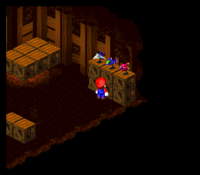
While Captain Falcon himself does not appear in Super Mario RPG: Legend of the Seven Stars, a model of the Blue Falcon appears in Hinopio's shop.
Mario Kart 8 / Mario Kart 8 Deluxe[edit]
Though Captain Falcon does not directly appear in Mario Kart 8 and Mario Kart 8 Deluxe, his amiibo is compatible with the game, allowing the player to customize their Miis with a Captain Falcon-themed outfit if the player is to connect the Captain Falcon amiibo to the GamePad. Other elements from the F-Zero series appear in the game in the The Legend of Zelda × Mario Kart 8 and Animal Crossing × Mario Kart 8 DLC packs; Captain Falcon's trademark Blue Falcon and F-Zero themed tracks named Mute City and Big Blue respectively, which even features F-Zero music. Artwork of Captain Falcon from F-Zero X also appears on large television screens around Mute City, along with his signature quote, "Show me your moves!"
Super Mario Maker[edit]
Captain Falcon appears in Super Mario Maker as a Mystery Mushroom costume, using sound effects from the original SNES F-Zero. It can randomly be unlocked after completing the 100 Mario Challenge on Normal or harder, or unlocked by scanning the Captain Falcon amiibo.
Audio samples[edit]
| File info |
Names in other languages[edit]
| Language | Name | Meaning | Notes |
|---|---|---|---|
| Japanese | キャプテン・ファルコン[?] Kyaputen Farukon |
Captain Falcon | |
| Chinese (Simplified) | 飞隼队长[?] MFēisǔn Duìzhǎng (Mandarin) |
Captain Flying Falcon | |
| Chinese (Traditional) | 飛隼隊長[?] Fēisǔn Duìzhǎng (Mandarin) |
Captain Flying Falcon | |
| Dutch | Captain Falcon[?] | - | |
| French (Canadian) | Capitaine Falcon[?] | Captain Falcon | |
| French (European) | Captain Falcon[?] | "Captain" remains in English, unlike with the NTSC French version. | |
| German | Captain Falcon[?] | - | |
| Italian | Captain Falcon[?] | - | |
| Korean | 캡틴 팔콘[?] Kaeptin Palkon |
Captain Falcon | |
| Portuguese | Captain Falcon[?] | - | |
| Russian | Капитан Фэлкон[?] Kapitan Felkon |
Captain Falcon | |
| Spanish (Latin American) | Capitán Falcon[?] | Captain Falcon | |
| Spanish (European) | Captain Falcon[?] | "Captain" remains in English, unlike with the NTSC Spanish version. |
Jigglypuff[edit]
- Bulbapedia article: Jigglypuff (Super Smash Bros.)
- SmashWiki article: Jigglypuff
Jigglypuff is a Normal/Fairy-type Pokémon (a pure Normal-type Pokémon prior to the Fairy type's introduction in Generation VI) from the Pokémon series. Its first appearance was in the Japanese Pokémon Red and Pokémon Green, which later became the international Pokémon Red Version and Pokémon Blue Version. Classified as the Balloon Pokémon, Jigglypuff evolves from Igglybuff and into Wigglytuff.
Super Smash Bros. series[edit]
Super Smash Bros.[edit]
- SmashWiki article: Jigglypuff (SSB)
In the original Super Smash Bros., Jigglypuff is an unlockable character, unlocked by clearing 1P Game once, and then defeating it on Saffron City. Jigglypuff is voiced by Rachael Lillis in English and Mika Kanai in the original Japanese, its respective voice actors in Pokémon media.
Jigglypuff was designed to be the weakest character in the game.[3] Jigglypuff is the lightest playable character; while it has up to five midair jumps, tied with Kirby for the most, Jigglypuff can also be launched the easiest. In addition, when Jigglypuff's shield breaks, it is launched higher into the air than any other character, potentially KOing it. Jigglypuff also has a high air speed and the lowest falling speed, but also has low walking and dashing speeds. Its attacks are also slow and weak.
Jigglypuff's neutral special is Pound, in which it slaps its opponents. Its up special is Sing, which puts nearby opponents to sleep, and its down special is Rest, which sends any opponents close enough flying but puts Jigglypuff to sleep.
The Japanese version of the game has both "Purin!" and "Jigglypuff!" announcements.
Gallery[edit]
Super Smash Bros. Melee[edit]
- SmashWiki article: Jigglypuff (SSBM)
Jigglypuff returns in Super Smash Bros. Melee. According to its page on the Japanese website, Sakurai was torn over whether to have Jigglypuff return or not, but kept it so as to not leave behind fans of the character.[3] Like in the original Super Smash Bros., Jigglypuff can be unlocked by clearing Classic or Adventure with any character, or by playing 50 Melee matches, and then defeating it on Pokémon Stadium.
Like other re-introduced characters, Jigglypuff's neutral special move, Pound, was made into its side special move, and its new neutral special move is Rollout, which allows Jigglypuff to charge an attack in which it rolls across the screen. Its air speed has been increased for this game, giving it the highest air speed of any character. All of Jigglypuff's jumps also now give height, though the height given decreases as it continues to jump.
Gallery[edit]
Super Smash Bros. Brawl[edit]
- SmashWiki article: Jigglypuff (SSBB)
In Super Smash Bros. Brawl, Jigglypuff returns as an unlockable character once again. It can be unlocked by clearing at least 20 Event Matches after finishing The Subspace Emissary, playing 350 Brawl matches, or by having it join the party in The Subspace Emissary. Similarly to the previous game, Jigglypuff (along with Wolf and Toon Link) was nearly cut from the game due to time constraints.[4] Jigglypuff has only five recolors in Super Smash Bros. Brawl, instead of the usual six; this is shared with Pokémon Trainer, Lucario, and Sonic.
While Jigglypuff's general moveset is unchanged, it has been given a Final Smash, Puff Up. Jigglypuff increases in size dramatically, bouncing players off of it at great speed.
The Subspace Emissary[edit]
Like Toon Link and Wolf, it makes a rather minor Subspace Emissary appearance, and is the only veteran character who does not appear in the main story of The Subspace Emissary. After finding a red door in The Swamp stage, the player will be taken to Pokémon Stadium 2 and fight Jigglypuff in a one-stock match. Once defeated, it will join the player's party.
Gallery[edit]
Super Smash Bros. for Nintendo 3DS / Super Smash Bros. for Wii U[edit]
- SmashWiki article: Jigglypuff (SSB4)
Jigglypuff returns once again as an unlockable character in Super Smash Bros. for Nintendo 3DS, and for the first time as a default playable character in Super Smash Bros. for Wii U. It can be unlocked in the Nintendo 3DS version by collecting 30 pieces of equipment, or by winning 120 matches, and is the only playable Pokémon character to be unlockable in the game. All of its moves and its Final Smash from Super Smash Bros. Brawl are kept in this game.
Gallery[edit]
Super Smash Bros. Ultimate[edit]
- SmashWiki article: Jigglypuff (SSBU)
Jigglypuff appears as an unlockable playable character in Super Smash Bros. Ultimate. Compared to Super Smash Bros. for Nintendo 3DS / Wii U, it moves faster on the ground and in the air, and many of its attacks are more powerful. In addition, Jigglypuff makes an angry expression during its Puff Up move.
World of Light[edit]
Jigglypuff is not seen when the fighters oppose Galeem for the first time. However, it is hit by one of Galeem's beams of light and imprisoned in the World of Light like the other non-DLC fighters (except for Kirby), and multiple puppet fighters of it are created. The actual Jigglypuff is eventually defeated, awakening it, and it joins Kirby's team in the battle against Galeem and Dharkon.
Jigglypuff's fighter spirit uses its artwork from Pokémon Global Link.
Classic Mode route[edit]
Jigglypuff's Classic Mode route is themed on the original Super Smash Bros.
| All Original, All 64 | ||||
|---|---|---|---|---|
| Round | Opponent(s) | Stage | Song | |
| 1 | Link (green costume) | Hyrule Castle | Overworld Theme - The Legend of Zelda (64) | |
| 2 | Mario | Peach's Castle | Ground Theme - Super Mario Bros. (64) | |
| 3 | Samus, Yoshi | Super Happy Tree | Yoshi's Story (64) | |
| 4 | Kirby, Fox | Dream Land | Gourmet Race (64) | |
| 5 | Pikachu | Saffron City | Main Theme - Pokémon Red & Pokémon Blue (64) | |
| 6 | Luigi, Ness, Captain Falcon, Jigglypuff | Battlefield | Final Destination - Super Smash Bros. | |
| Final | Giant Donkey Kong | Kongo Jungle (Ω) | Jungle Level (64) | |
Gallery[edit]
[edit]
Mario Artist: Paint Studio[edit]
Artwork of Jigglypuff from Pokémon Red Version and Pokémon Green Version can be used as a stamp in Mario Artist: Paint Studio.
Super Mario Maker[edit]
Jigglypuff appears as one of the Costume Mario costumes in Super Mario Maker, which can be unlocked either by using the Jigglypuff amiibo or by clearing 100 Mario Challenge on Normal difficulty or greater. Its sprite is based upon the overworld sprite used in the Nintendo DS Pokémon games. Like the other Smash for 3DS/Wii U-based Pokémon costumes, Jigglypuff does not have any altered sound effects.
Audio samples[edit]
| File info |
| File info |
Names in other languages[edit]
| Language | Name | Meaning | Notes |
|---|---|---|---|
| Japanese | プリン[?] Purin |
The Japanese term for "pudding"; may also be a combination of「風船」(fūsen, "balloon") and「膨れる」(fukureru, "to expand"). | |
| Chinese | 波波球[?] Bōbōkàuh (Cantonese) |
From「波」(bō) and「球」(kàuh), both meaning "ball" | Hong Kong |
| 胖丁[?] Pàngdīng (Mandarin) |
Combination of「胖」(pàng, "fat") and「布丁」(bùdīng, "pudding") | Taiwan, Mainland China | |
| Dutch | Jigglypuff[?] | - | |
| French | Rondoudou[?] | From rond ("round", "chubby"), roudoudou (a French affectionate nickname for children), doudou (a doll for the children's comfort), and doux ("soft") | |
| German | Pummeluff[?] | From pummelig ("chubby") and fluff | |
| Italian | Jigglypuff[?] | - | |
| Korean | 푸린[?] Purin |
Transliteration of the Japanese name | |
| Portuguese | Jigglypuff[?] | - | |
| Russian | Джиглипафф[?] Dzhiglipaff |
Jigglypuff | |
| Spanish | Jigglypuff[?] | - |
References[edit]
- ^ "To tell the truth, initially he was going to be replaced by the protagonist of MOTHER 3, but stuff happened and there were delays, so we ended up going back to the original. " [1] (Japanese) Nintendo. Retrieved June 2, 2018.
- ^ PushDustin. (April 13, 2015) The Definitive Unused Fighters List in Smash Source Gaming. Retrieved June 2, 2018.
- ^ a b nocturnal YL (October 13, 2015). News Flash! Smash Bros. Dojo: Jigglypuff. Source Gaming. Retrieved August 18, 2016 on the original Jigglypuff article. (Archived October 14, 2015, 08:54:53 UTC via Wayback Machine.)
- ^ Soma (August 17, 2015). Sakurai answers some (old) questions– about Brawl! Source Gaming. Retrieved August 18, 2016.
| Super Smash Bros. | ||||
|---|---|---|---|---|
| Playable characters | Donkey Kong • Fox • Kirby • Link • Luigi • Mario • Samus • Yoshi • Others | |||
| Non-playable characters | Bob-omb • Whispy Woods | |||
| Bosses | Giant Donkey Kong • Metal Mario | |||
| Stages | Peach's Castle • Yoshi's Island • Congo Jungle • Hyrule Castle • Meta Crystal • Mushroom Kingdom • Others | |||
| Items | Barrel • Bob-omb • Bumper • Crate • Egg • Fire Flower • Green Shell • Hammer • Red Shell • Star • Star Rod • Target | |||
| Moves | Miscellaneous | Jump • Taunt | ||
| Special | Standard | Up | Down | |
| Mario | Fireball | Super Jump Punch | Mario Tornado | |
| Luigi | Green Fireball | Luigi Cyclone | ||
| Donkey Kong | Giant Punch | Spinning Kong | Hand Slap | |
| Yoshi | Egg Lay | Egg Throw | Yoshi Bomb | |
| Promotional content | 1999 Nintendo Power Awards • Ask Dan • Ask Uncle Tusk • Miyamoto on Zelda • Rösta på ditt favoritspel och vinn en N64! • Smash Card • Super Smash Bros. Poll • Super Smash Bros. (Shockwave game) | |||
| Other | Emblem • Gallery • Glitches • Pre-release and unused content • Quotes • Staff | |||
